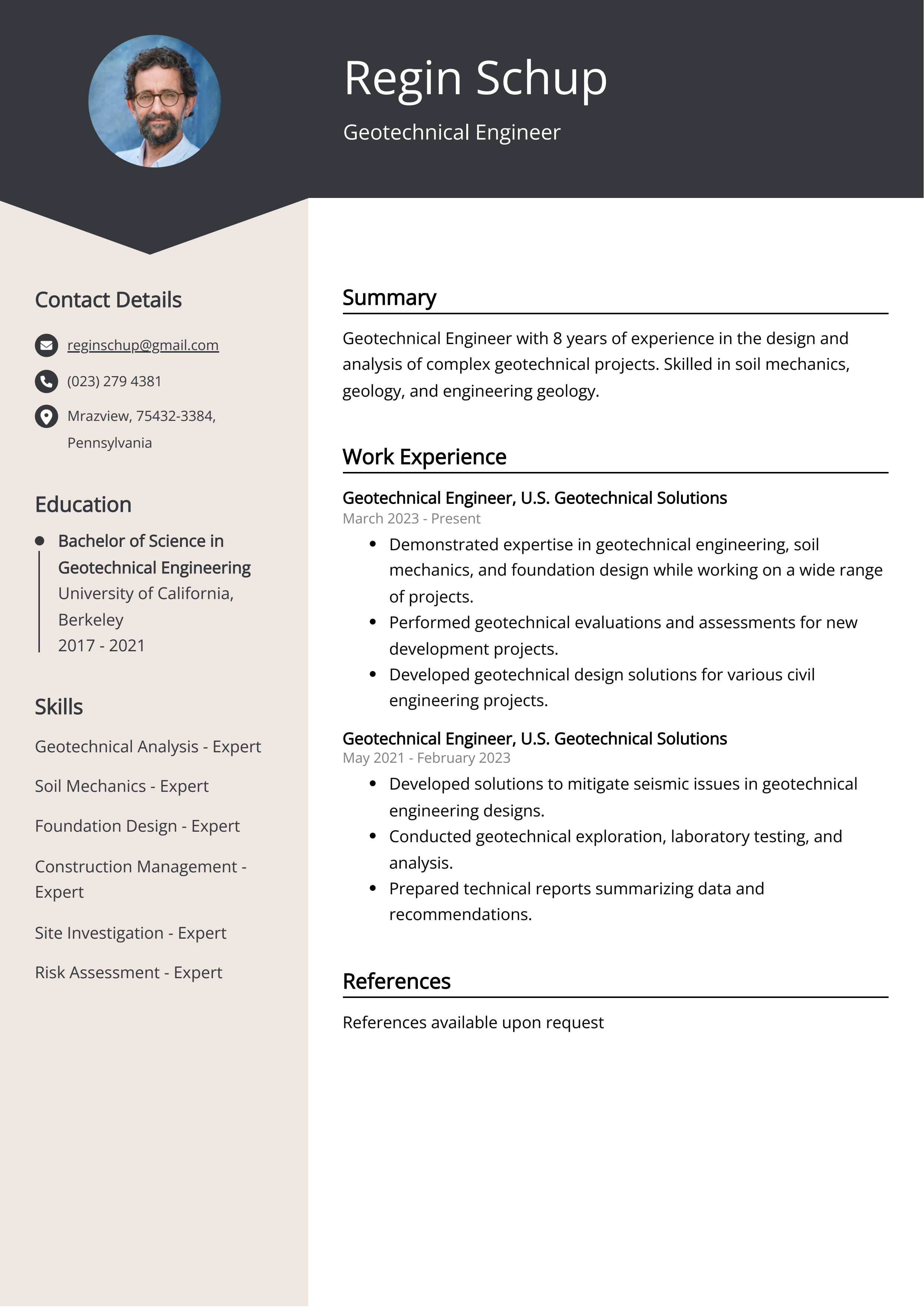The Best Guide To Geotheta
The Best Guide To Geotheta
Blog Article
Geotheta Fundamentals Explained
Table of ContentsNot known Details About Geotheta Examine This Report on GeothetaAll about GeothetaSome Known Details About Geotheta The Ultimate Guide To Geotheta

They perform site examinations, collect examples, do lab examinations, and examine information to evaluate the viability of the ground for building projects - Consulting Engineers. Based upon their findings, geotechnical designers supply suggestions for foundation style, incline stability, keeping structures, and reduction of geotechnical dangers. They team up with other experts, such as designers, architectural designers, and construction teams, to make sure that geotechnical factors to consider are incorporated into the overall job design and application
By assessing the actions and residential or commercial properties of dirt and rock, they can determine potential geotechnical hazards such as landslides, soil settlement, or slope instability. Their knowledge helps stop failures or accidents that might threaten lives and residential property. Right here are some in-depth obligations and responsibilities of a geotechnical designer: Site Investigation: Geotechnical engineers conduct site examinations to gather data on subsurface conditions.
They interpret the data to recognize the residential or commercial properties and actions of the dirt and rock, including their strength, leaks in the structure, compaction qualities, and groundwater problems. Geotechnical Analysis and Layout: Geotechnical designers analyze the data gathered during website investigations to examine the security and viability of the site for building and construction projects. They perform geotechnical estimations and modeling to evaluate aspects such as birthing ability, settlement, incline stability, side planet pressures, and groundwater flow.
Rumored Buzz on Geotheta
Foundation Design: Geotechnical engineers play an important role in designing foundations that can safely support the desired framework. They analyze the dirt conditions and lots demands to figure out the proper foundation kind, such as shallow foundations (e.g., grounds), deep structures (e.g (https://sketchfab.com/geotheta)., heaps), or specialized strategies like dirt improvement. They take into consideration aspects such as negotiation limits, bearing ability, and soil-structure communication to create optimum structure layouts
They examine building plans, display site activities, and perform field assessments to verify that the layout referrals are complied with. If unexpected geotechnical issues arise, they evaluate the scenario and provide suggestions for remediation or adjustments to the design. Risk Analysis and Reduction: Geotechnical engineers evaluate geotechnical risks and dangers linked with the job site, such as landslides, liquefaction, or dirt disintegration.

Cooperation and Interaction: Geotechnical designers function very closely with other experts associated with a job, such as architects, structural engineers, and building teams. Effective communication and collaboration are vital to integrate geotechnical considerations into the general task style and construction process. Geotechnical designers supply technical knowledge, answer questions, and make sure that geotechnical requirements are satisfied.
Geotheta for Dummies
Right here are some sorts of geotechnical designers: Structure Designer: Structure designers focus on designing and evaluating foundations for structures. They analyze the soil conditions, lots needs, and website attributes to determine one of the most ideal foundation kind and layout, such as superficial structures, deep structures, or specialized techniques like heap structures.
They examine the aspects influencing incline security, such as soil homes, groundwater conditions, and incline geometry, and develop techniques to prevent incline failures and reduce risks. Earthquake Designer: Quake engineers concentrate on evaluating and developing frameworks to withstand seismic pressures. They evaluate the seismic risk of a website, examine dirt liquefaction potential, and establish seismic style standards to ensure the safety and durability of structures during quakes.
They perform area testing, accumulate examples, and evaluate the gathered information to define the dirt buildings, geologic developments, and groundwater problems at a website. Geotechnical Instrumentation Engineer: Geotechnical instrumentation designers concentrate on monitoring and determining the behavior of dirt, rock, and frameworks. They set up and maintain instrumentation systems that keep an eye on variables such as dirt settlement, groundwater levels, slope motions, and architectural displacements to assess performance and provide early cautions of possible concerns.
How Geotheta can Save You Time, Stress, and Money.
They carry out tests such as triaxial examinations, debt consolidation tests, straight shear examinations, and leaks in the structure tests to collect data for geotechnical analysis and design. Geosynthetics Engineer: Geosynthetics engineers focus on the design and application of geosynthetic products, such as geotextiles, geogrids, and geomembranes. They use these materials to improve soil security, reinforce slopes, provide water drainage remedies, and control disintegration.
They tend to be investigatory people, which suggests they're intellectual, reflective, and investigative. They are curious, methodical, sensible, logical, and sensible. Some of them are additionally social, suggesting they're kind, charitable, participating, person, caring, valuable, understanding, skillful, and friendly. Does this noise like you? Take our totally free profession examination to learn if geotechnical designer is among your leading profession matches.
In the office atmosphere, geotechnical designers utilize specialized software program tools to perform calculations, produce layouts, and analyze information. They prepare reports, testimonial job requirements, communicate with clients and group participants, and coordinate project tasks. The workplace setting offers a conducive atmosphere for research study, evaluation, and cooperation with various other professionals entailed in the project.
Rumored Buzz on Geotheta
They regularly check out project websites to carry out website investigations, evaluate geotechnical problems, and collect information for evaluation. These check outs include taking a trip to different areas, occasionally in remote or challenging terrains. Geotechnical engineers may do soil tasting, conduct examinations, and screen building tasks to make sure that the geotechnical aspects of the task are being implemented properly.
Geotechnical engineers likewise function in specialized geotechnical labs. Geotechnical laboratory designers work extensively in these atmospheres, handling testing tools, running instruments, and recording data.
Report this page